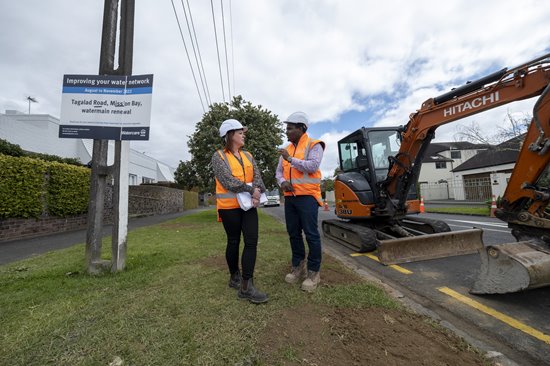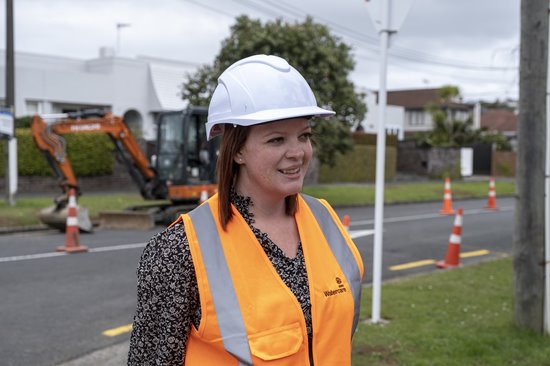
Photo: Our watermain renewal programme in action in Mission Bay
Today (Friday 4 August) we kick off our search for businesses to partner with on the first half of a decade-long $3.5 billion programme to replace ageing water and wastewater pipes and upgrade pump stations and treatment plants.
We're releasing our request for proposal (RFP) to the construction industry today, and general manager asset renewals and upgrades Suzanne Lucas is excited to have reached this milestone. “It’s a really exciting day for us. There’s been a huge amount of planning just to get to this point, and we obviously still have a massive amount of work ahead of us to deliver this programme of work for our customers.
“This $3.5b programme includes the biggest investment we’ve ever made in proactive replacements of Auckland’s water and wastewater network pipes, which makes up about three-quarters of the overall programme.
“It’s a move away from the traditional ‘fix it when it breaks’ philosophy to a much more strategic and proactive approach. Ultimately, this programme means our customers can expect fewer leaks, fewer water outages and fewer wastewater overflows.

Photo: Watercare general manager asset renewals and upgrades Suzanne Lucas
“It’s a big investment", says Lucas, "but over time we should see the benefit of that investment with a reduced spend on reactive maintenance work from fewer pipe breaks, for example. It also means that with a confirmed forward works programme, it’s easier for us to plan and coordinate work with other agencies so we can minimise disruption by only digging up a street once.”
Head of supply chain Stuart Bird says, the industry was consulted on our plans with the renewal programme over the past 8 months. “The feedback has been overwhelmingly positive. There are significant benefits to adopting a partnership approach – both to us and the contractors we end up working with, who will be small to medium-sized businesses.
“For the industry it means the certainty of a forward works programme, which in turn gives them the confidence to invest in the right people and best technology to do the job.
“And for us it means more efficient delivery, improved quality and consistency and stronger relationships with our supply chain as we work together to meet our cost, carbon and health and safety targets.”
Bird says the traditional project-by-project procurement process simply wouldn’t have worked for the volume of projects this programme of work will cover.
“The traditional project tendering process consumes a huge amount of time – both at our end, and for the contractors hoping to get the work. It’s far more efficient to group the work into a five-year programme and have one intensive selection process.”
The deadline for proposals is September 8. We hope to be awarding contracts before Christmas.
As part of this process, we are setting up a Māori supplier network – a pre-approved list of relevant suppliers who can supply services including electrical, scaffolding, landscaping, civil works and plant or labour hire.
“We have a target to have 5% of our annual total contract spend going to Māori businesses by 2025,” Bird says. “For the past financial year, our spend with Māori businesses was 2.2% – so we do have a way to go, and we’ll need businesses in our supply chain to help us get there. By setting up the Māori supplier network, we’re helping to connect contractors to businesses who can do the mahi.
“This is something I’m personally passionate about – it’s about lifting up the Māori economy and ensuring Māori businesses have the opportunity to work with us.”